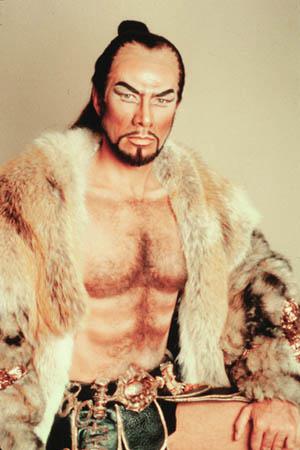
Samuel Ramey as Attila.
Photo © IMG Artists from the artist's website.
First, some history.
I went to my first opera at City Opera in 1983, the year a strike nearly sunk that company three decades ago. It was Puccini's Turandot. I was 9 years old, and I went with my parents. They bought me a chocolate ice cream and a libretto. The three ministers, Ping, Pang and Pong, and the three riddles fascinated my young brain. The music was good too.
That year, Mom and Dad took me to three more operas. La bohéme.. Candide. Carmen. I still have the librettos somewhere. And I was hooked. The New York State Theater was part of my childhood. And teenage years. And adulthood. And career. Well, you get the idea.
I "grew up" in that theater. Here's some great performances I attended. Y'know--if the company thought about reviving some of these productions, I'll bet people would go see them and have a nice time.
Attila with Samuel Ramey.
The first Verdi Opera that I "got"--probably saw this in 1984 or so. My first exposure to Mr. Ramey in a role that became one of his career trademarks.
Der Rosenkavalier staged by Jonathan Miller
My first live performance of this Strauss comedy--an opera that I had already begun to fall in love with. I saw this when I was starting at Citysearch--in fall of 1996.
Falstaff with Sherrill Milnes
The great American baritone was at the very end of his career when he put on the fat-man suit to play merry old Jack in an imported production of Falstaff. 1996. It was not the greatest performance but a memorable, emotional night. A 1999 staging of the opera (imported from Glimmerglass) was fantastic, with Mark Delevan in the title role.
L'Italiana in Algeri with Kevin Glavine.
A 1997 Glimmerglass import, this rich staging of Rossini's comedy of culture clash featured the fine bass of character singer Mr. Glavine. The image I'll never forget though was the Bey of Algiers, in a 1950s style kitchen, taking Rossini's silly Sacred Oath of the Pappitacci while wearing a dressing gown and waving a full box of pasta over his head. Minchia!
Xerxes with David Daniels and Lorraine Hunt.
This City Opera presentation of a staging that originated at the Santa Fe Opera. This memorable 1997 evening introduced me to the gorgeous singing of Mr. Daniels and Ms. Hunt. More importantly, Xerxes jump-started a long run of successful baroque operas at the State Theater, making the music of Handel and Gluck a trademark at the house.
Iphegenie en Tauride staged by Francesca Zambello
1998. This was a powerful production by the new head of the Glimmerglass Opera. Ms. Zambello set the action of Gluck's mythological drama in a dark, terrifying bunker, more like a war zone than a Greek temple. There were stage pictures I'll never forget, and a sense of terror and urgency missing in the Met's current version by Stephen Wadsworth.
Lizzie Borden by Jack Beeson.
Mr. Beeson sat next to this young critic at the City Opera's first performances (1998?) of his opera. A gentleman. This bloody version of this American take on the Elektra myth, with Lauren Flanigan getting axed as Lizzie's mother. Except that it really happened.
Die Tote Stadt by Erich Wolfgang Korngold City Opera used to regularly revive this classic 20th century opera by Korngold, an underrated composer who wrote both opera and libretto when he was just 19. Their staging featured projections of the "dead city" of Bruges, creating a surreal dreamworld on the stage. I think I saw it three times--maybe four.
The Mines of Sulfur by Richard Rodney Bennett
A late import from the Glimmerglass Festival, this genuinely spooky ghost story by an acclaimed British film composer was memorable for its strong melodies and compelling story of a group of robbers that take over a manor house, only to find themselves on the wrong side of the twilight zone. I think I saw it in 2005 or 2006 but I don't remember.
Intermezzo by Richard Strauss
One of the cleverest uses of the City Opera's limited stage resources as the company mounted a Strauss opera that the Met wouldn't touch with a ten-foot pole. And it even had a tobaggan sequence with real live skiing. The City Opera repeated the feat a few years later with Daphne, opening the season with the mythological drama that ends with the title character turned magically into a tree.

